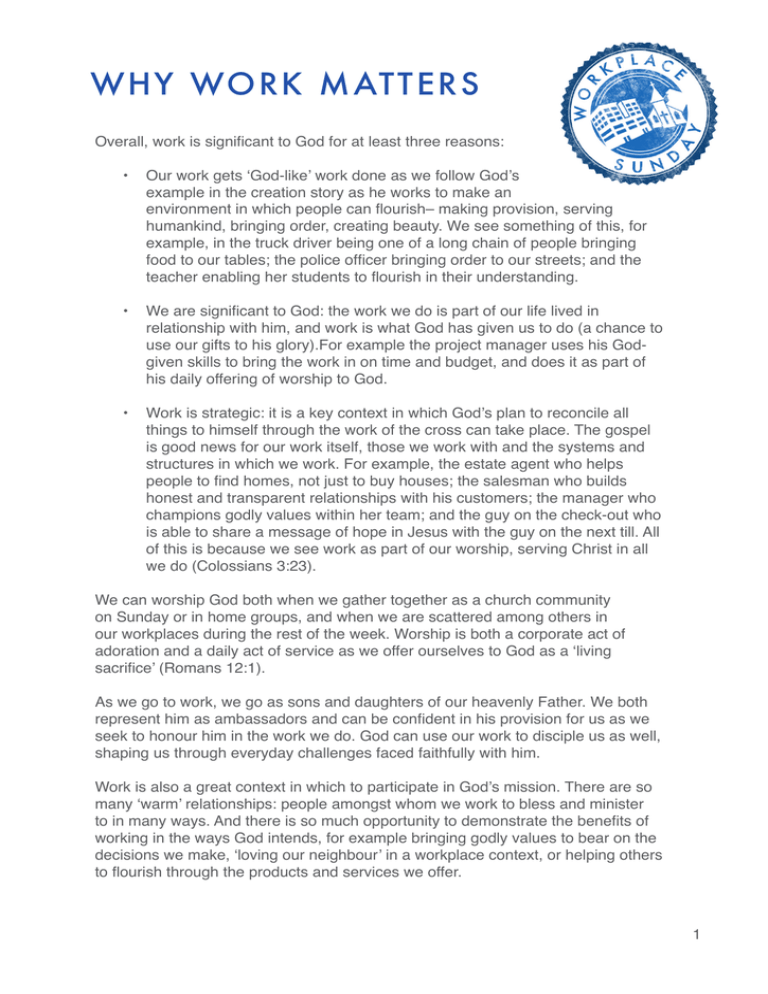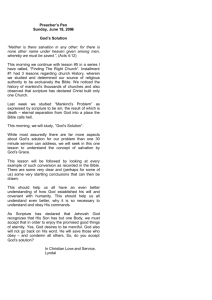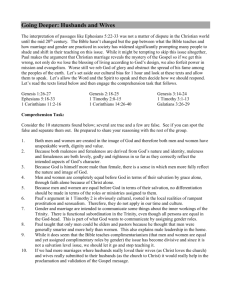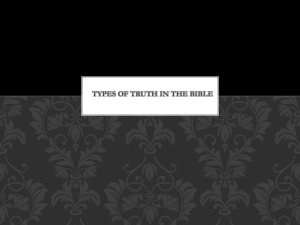WHY WORK MATTERS
advertisement

WHY WORK MATTERS Overall, work is significant to God for at least three reasons: • Our work gets ‘God-like’ work done as we follow God’s example in the creation story as he works to make an environment in which people can flourish– making provision, serving humankind, bringing order, creating beauty. We see something of this, for example, in the truck driver being one of a long chain of people bringing food to our tables; the police officer bringing order to our streets; and the teacher enabling her students to flourish in their understanding. • We are significant to God: the work we do is part of our life lived in relationship with him, and work is what God has given us to do (a chance to use our gifts to his glory).For example the project manager uses his Godgiven skills to bring the work in on time and budget, and does it as part of his daily offering of worship to God. • Work is strategic: it is a key context in which God’s plan to reconcile all things to himself through the work of the cross can take place. The gospel is good news for our work itself, those we work with and the systems and structures in which we work. For example, the estate agent who helps people to find homes, not just to buy houses; the salesman who builds honest and transparent relationships with his customers; the manager who champions godly values within her team; and the guy on the check-out who is able to share a message of hope in Jesus with the guy on the next till. All of this is because we see work as part of our worship, serving Christ in all we do (Colossians 3:23). We can worship God both when we gather together as a church community on Sunday or in home groups, and when we are scattered among others in our workplaces during the rest of the week. Worship is both a corporate act of adoration and a daily act of service as we offer ourselves to God as a ‘living sacrifice’ (Romans 12:1). As we go to work, we go as sons and daughters of our heavenly Father. We both represent him as ambassadors and can be confident in his provision for us as we seek to honour him in the work we do. God can use our work to disciple us as well, shaping us through everyday challenges faced faithfully with him. Work is also a great context in which to participate in God’s mission. There are so many ‘warm’ relationships: people amongst whom we work to bless and minister to in many ways. And there is so much opportunity to demonstrate the benefits of working in the ways God intends, for example bringing godly values to bear on the decisions we make, ‘loving our neighbour’ in a workplace context, or helping others to flourish through the products and services we offer. 1 So an undivided ‘whole-life’ view opens up all of life as an opportunity for Christians to love and serve God and others, and our work is a major part of that. WHAT DOES SCRIPTURE SAY MORE BROADLY ABOUT WORK? Alongside the great opportunities we have as Christians to serve in the workplace, we can see that work has come to dominate 21st century life in wider Western society, in some cases bringing with it an unhealthy focus. It’s easy to be caught up in the highly pressurised and performance/reward driven environment of today’s workplace and to lose sight of the tremendous opportunities work brings to serve others. Scripture brings a vital perspective to all of life, and to our work, helping us to steer a healthier path as we learn to read God’s word with fresh eyes. As we look at what scripture says about work, we need to be careful not to try to apply the Bible to our working life, but to apply our working life to the Bible i.e. not to be conformed to the pattern of this world but to let scripture transform our thinking (Romans 12:1,2). No one chapter in the Bible gives us a complete picture of work, rather the picture is laid out across the whole of scripture in the various ‘acts’ of the Bible: moving through the story the Bible tells in Creation, Corruption, Covenant, Cross, Church and Consummation. CREATION - GOD’S ORIGINAL INTENT FOR WORK Genesis 1 and 2 God shows himself to be a worker in the act of creation, laying out a pattern for good work • Creating a context for human flourishing • Bringing order out of chaos – first forming water, sky and earth then filling what he had formed with fish, birds and animals in order • Making provision for all, creating beauty and reflecting on its goodness • Establishing a Sabbath rhythm • Giving the ‘cultural mandate’ to men and women together to take his good work and extend it over all the earth by cultivating what had been created So, for example, Genesis 1:27,28 - humans created to rule over, govern and fill the earth both in terms of household (be fruitful and multiply: bearing and raising children) and creation (rule over every living creature; cultivate the land). Genesis 2:4 - creation in the sense of plants and shrubs had to wait for water but also for people to cultivate the ground – so work is closely linked to the well-being and sustainability of creation. Genesis 2:15 – humans were placed in God’s ‘garden’ specifically to work it and take care of it, made and working in God’s image. 2 Genesis 2:19,20 - a cameo scene in which God shows how much he is interested in Adam’s work, coming to see what he would name the animals. Our work matters to God because it is God’s creation that we are responsible for, and he cares about us and what we do. So work in God’s original intent was both service and worship to God as his delegated representatives overseeing his creation; taking God’s raw materials and turning them into products that promote human flourishing (as Martin Luther said “If the wool is on the sheep, it makes no garment”); providing services that bless others; all the while having regard for the care of creation. Work was given to us in the context of community. It is the mode through which we act to benefit others, and we receive the benefit of others’ work, their gifts and abilities. CORRUPTION - THE IMPACT OF SIN Genesis 3 Disobedience to God’s instruction (Genesis 2:16, 3:1-6) damaged a number of relationships, between: woman and childbirth; people and work; people and God; people and creation; creation and God. So work became toilsome and hampered by ‘thorns and thistles’: service is tainted by self-serving; fruitfulness is frustrated by futility. ILLUS TRATIONS How do thorns, thistles and sweat manifest themselves in today’s working life? • • • The frustration of a project that fails or runs over The stress of long hours demanded by productivity targets The failure of a family business during recession ECCLESIASTES AND THE FUTILIT Y OF LIFE This is especially evident in the book of Ecclesiastes as it expresses the frustration of our fallen condition. In Ecclesiastes 2:17-26, the somewhat jaded author recognises that work is given by God, but also the temporary and fleeting nature of what is accomplished when death intervenes, the pressures of work that occupy our waking and sleeping thoughts, and despairs at the meaninglessness of it all! And yet, this is not the end of the story: as scripture often says ‘But God’ … Ecclesiastes is set at one stage of the overarching story of God’s salvation of our fallen-ness and its impact on creation. But as we look forward towards the end of 3 the story, we can make sense of the ‘in-between’ times in which we currently live. We find meaning in the work we do when we do it ultimately for God, in his image and strength and to his glory. G O D ’ S P L A N F O R S A LVAT I O N … We were created as workers in God’s image, so work is an essential part of our humanity now, just as it is essential for creation and for society. And so, we are redeemed as workers as well. God’s plan for salvation includes all that it means to be human, including work. COVENANT - GOD CALLS A PEOPLE AND RE-MAKES A CULTURE The calling of God’s people Israel, their enslavement and escape from Egypt, the establishment of Israel in the ‘promised land’, the giving of the law and their subsequent disobedience and exile all foreshadow God’s ultimate act of salvation through the work of Jesus on the cross. Woven within the story of Israel, we can see God’s salvation plan, which includes work from the start. As God uses Moses to lead his people out of slavery in Egypt, he establishes a new culture for them through various instructions recorded in Exodus, Leviticus, Numbers and Deuteronomy. These cover not only how to worship God appropriately for that time, and how to live well in community, but also how to work well, with regard for Sabbath rest, holidays (festivals), timely and fair pay and conditions for workers, and dealing fairly with customers to name a few. All of this within the context of a just economic system laid out in the principles of Jubilee. ILLUS TRATIONS Does the culture we see God initiating throuh Old Testament law have anything to say to how we work today? • Many of the scandals headlined over the past few years have come from dishonest (and sometimes illegal) dealing with customers e.g., phone tapping, LIBOR rigging, the misselling of payment protection insurance • While working conditions overall have improved in the UK in recent times, levels of demand on employees to ‘produce more for less’ or to work long hours has risen CONSUMMATION – CREATION RENEWED Looking forward to the new creation, in which Heaven comes down to earth, Paul describes a real physical experience of resurrection in 1 Corinthians 15:35-58. Our current physical experience of creation is renewed in a physical new creation, and as part of the new creation Isaiah paints a picture of redeemed work (Isaiah 65:1725). 4 This is not just a picture of ‘spiritual effort’ but includes real physical work such as building houses and cultivating vineyards and reverses the curse of sin recorded in Genesis 3, restoring the enjoyment of the work of our hands and banishing work’s frustration. It’s a picture of people fully human without sin’s pollution and corruption and part of that restored picture is restored work. Revelation 21 pictures a redeemed, renewed creation rather than one that is rubbed out and replaced. The destination is earth not heaven, but in some way, heaven joins with earth with God once again dwelling with us in his Holy City. The nations of the earth are pictured bringing into the City their glory and honour. This is not the most important people, but rather all that is best, all that is good and redeemable from the civilisations and cultures that have been produced by millions of people over thousands of years. CROSS AND CHURCH - WORK IN THE CURRENT AGE Our work in the current age can have meaning, purpose and hope because of the hope of salvation that we see envisaged in the new creation. The futility of work in a fallen world expressed by Ecclesiastes is not the whole story. God is reconciling all things to himself through Christ’s work on the cross (Colossians 1:20). ‘All things’ means not less than the salvation of individual souls, but beyond that a cosmic salvation including all of creation and our work in connection with that creation. Paul in Colossians 3:22 – 4:1 and Ephesians 6:5-9 includes work done within the master / slave / household-servant regime of the 1st century Roman Empire. In fact, he says ‘Whatever you do, do it with all your heart as working for the Lord not men’: so our work when done for the Lord is not in vain. As followers of Jesus, entrusted with the gospel message, this must include evangelism. Alongside that, our work is also a means to get godly work done and to live faithfully as the people of God, demonstrating how work can be done to the glory of God and in ways that benefit those around us. Our work in these times is also governed ethically by the new creation. If corruption and lawlessness don’t feature in the new creation, neither should they in the work of our hands today. More positively, we can work to make what will be true in the new creation as true as possible now. This is the invitation we receive as followers of Christ to pray and work to see his ‘Kingdom come’, to see on earth his will be done as it is heaven (Matthew 6:10). We are to put off the old humanity and put on the new humanity (Colossians 3:5-14), working to show the world a new way of being human, towards being fully restored in Jesus Christ. In the work we do itself, with the people we work alongside and the institutions in which we work we are called to work with God as agents of transformation in society as we ourselves are being transformed through the work of the Holy Spirit within us. 5


